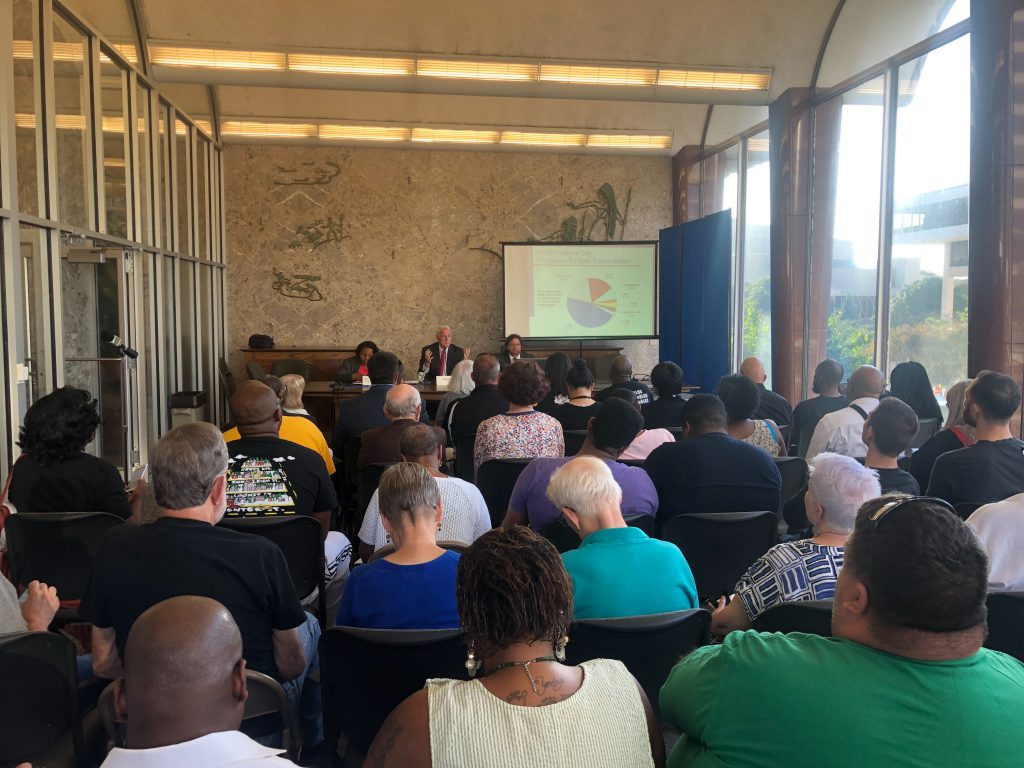Barrett Kicks Off 2020 Budget Process
Numbers are daunting. City between a rock and a hard place when it comes to finances.

Mayor Tom Barrett describes the city budget process at the 2019 preliminary budget hearing. Photo by Jeramey Jannene.
The debate surrounding the city’s 2020 budget got underway Thursday evening at the Zeidler Municipal Building. The budget, similar to last year, will again cause elected officials to weigh public safety funding against city services including alley repair and expanded funding for public health programs.
Mayor Tom Barrett, budget director Dennis Yaccarino and Common Council Finance & Personnel Committee chair Alderwoman Milele A. Coggs solicited feedback on the approximately $1.5 billion budget at a public hearing.
“This is really an attempt to educate the public and explain the biggest challenges I face each year,” said Barrett in a 45-minute presentation on the city’s precarious financial position.
Four factors are combining to put city officials in an increasingly difficult place: the rising costs of public safety, a quickly growing need to fund the city’s pension system, state restrictions on raising revenue and declining revenue sharing from the state.
State law both caps the city’s property tax levy with few exceptions and prevents it from raising new revenue from other sources including a sales tax or income tax. An even greater problem, state budget allocations have reduced the amount of shared revenue sent to Milwaukee and other municipalities since 2003, with no adjustments for inflation.
A city report notes that if the city received its 2003 allotment adjusted for inflation it would have received $333.9 million in 2018; instead it received $228.2 million, an effective annual loss of $105.7 million. Over the same time, annual state spending has increased by $7 billion.
“That’s why I have gone to Madison time and time again to say this system is broken,” said Barrett.
The declining shared revenue would be a big problem for the city all on its own, but the city has also faced steadily increasing public safety costs despite eliminating over 400 full-time equivalent positions from the police and fire departments since 2004.
“Beginning in 2016 the budget for the Milwaukee Police Department exceeded the property tax levy for the city,” said Barrett. “This creates an impossible mathematical situation.”
It’s going to get worse. Despite the fact that property values are growing, increasing the property tax levy, a new major cost has emerged for the city: employee pensions. The city’s annual pension contribution is expected to more than double in four years, consuming an additional $90 million annually.
City officials avoided having to make any pension contributions from 2004 to 2009 despite the city charter requiring the system to be fully funded. But that run of luck ended as the Great Recession hammered the financial markets.
In 2019, the city will contribute approximately $70 million to the pension system. Approximately 80 percent of that will go to support public safety employees that are exempt from Act 10.
Following the shock of having to make a nearly $40 million payment in 2009, the city uses a five-year smoothing formula from an actuarial consultant. When the current term expires in 2023, consultants are warning city officials to expect to have to start paying $160 million annually.
According to the mayor’s office, the primary driver in the increase is a change in the expected performance of the system’s assets. The anticipated return has been reduced from eight percent to 7.5 percent annually.
Debt service payments have also grown during Barrett’s tenure. In 2004, the city spent $54 million on debt service. In 2019 that total grew to $68.6 million. The mayor told the audience that concerns about debt were valid, but were not the biggest issue the city was facing.
There is good news: the city continues to make strides in avoiding the national problem of surging health care costs. Costs have only risen $8 million since 2012. “If this would have followed a national trend we would be paying an extra $50 million,” said Yaccarino. The budget director said improved employee safety training has also reduced injuries, saving money and improving employee health.
The city also saves approximately $4 million per year by prepaying its pensions obligations.
What’s not in the budget? Yaccarino, no doubt at the request of Barrett, took special care to point out that the 2020 budget will not include any property tax funds going to support The Hop or Democratic National Convention. Both efforts are planned to be reimbursed by federal grants and sponsorships.
Community Feedback
What do community members want to see? A primary desire is for a reallocation of public safety resource towards violence prevention.
Dozens of representatives of Black Leaders Organizing for Communities (BLOC) packed the hearing room, with organization political director Rick Banks being the first to speak.
“Right now our budget says we value policing and incarceration more than peace and violence prevention,” said Banks.
He singled out the efforts of Andre Lee Ellis and his “We Got This” program as an example of where funding should be going. “That’s violence prevention,” said Banks to applause, including from Barrett.
Activist Paul Mozina testified in favor of the city working to end its enforcement of the War on Drugs. Others testified about the need for better public infrastructure and more funding for lead abatement.
Multiple people testified that they would gladly go with Barrett to testify in Madison for more revenue.
Due to a scheduling conflict, Urban Milwaukee wasn’t able to stay for the entire public testimony period.
Barrett will present a final budget to the Common Council in late September. The Common Council’s Finance & Personnel Committee will then go line-by-line through the document before voting on a final budget in November.
View Barrett’s entire presentation.
If you think stories like this are important, become a member of Urban Milwaukee and help support real, independent journalism. Plus you get some cool added benefits.
More about the 2020 Milwaukee Budget
- City Hall: Council Overrides Every Barrett Veto - Jeramey Jannene - Nov 26th, 2019
- City Hall: Barrett Issues 8 Budget Vetoes - Jeramey Jannene - Nov 19th, 2019
- This afternoon the City of Milwaukee just got less safe - State Rep. Bob Donovan - Nov 8th, 2019
- City Hall: Council Cuts Police, Adopts $1.6 Billion Budget - Jeramey Jannene - Nov 8th, 2019
- City Hall: Proposal Uses Lead Abatement Funds for Marketing - Jeramey Jannene - Nov 7th, 2019
- Transportation: Street Safety Funding Passes Committee - Jeramey Jannene - Nov 6th, 2019
- Omnibus budget amendment supports birthing moms pilot, violence interrupters, participatory budget initiative and more - Ald. Milele Coggs - Nov 1st, 2019
- Eyes on Milwaukee: Proposal Would Fund Emergency Housing - Jeramey Jannene - Oct 31st, 2019
- City Hall: Proposal Gives Residents a Basic Income - Jeramey Jannene - Oct 31st, 2019
- City Hall: Community Outpouring Over City Budget - Isiah Holmes - Oct 14th, 2019
Read more about 2020 Milwaukee Budget here
More about the Local Government Fiscal Crisis
- Mayor Johnson’s Budget Hikes Fees, Taxes In 2025, Maintains Services - Jeramey Jannene - Sep 24th, 2024
- New Milwaukee Sales Tax Collections Slow, But Comptroller Isn’t Panicking - Jeramey Jannene - Jun 28th, 2024
- Milwaukee’s Credit Rating Upgraded To A+ - Jeramey Jannene - May 13th, 2024
- City Hall: Sales Tax Helps Fire Department Add Paramedics, Fire Engine - Jeramey Jannene - Jan 8th, 2024
- New Study Analyzes Ways City, County Could Share Services, Save Money - Jeramey Jannene - Nov 17th, 2023
- New Third-Party Study Suggests How Milwaukee Could Save Millions - Jeramey Jannene - Nov 17th, 2023
- Murphy’s Law: How David Crowley Led on Sales Tax - Bruce Murphy - Aug 23rd, 2023
- MKE County: Supervisors Engage in the Great Sales Tax Debate - Graham Kilmer - Jul 28th, 2023
- MKE County: County Board Approves Sales Tax - Graham Kilmer - Jul 27th, 2023
- County Executive David Crowley Celebrates County Board Vote to Secure Fiscal Future and Preserve Critical Services for Most Vulnerable Residents - County Executive David Crowley - Jul 27th, 2023
Read more about Local Government Fiscal Crisis here
Political Contributions Tracker
Displaying political contributions between people mentioned in this story. Learn more.
- February 13, 2016 - Milele A. Coggs received $20 from Andre Lee Ellis




















